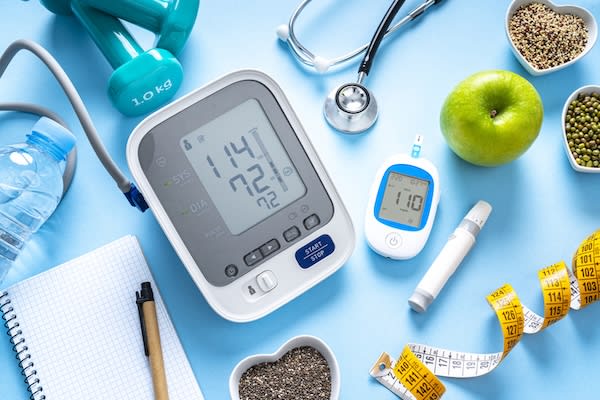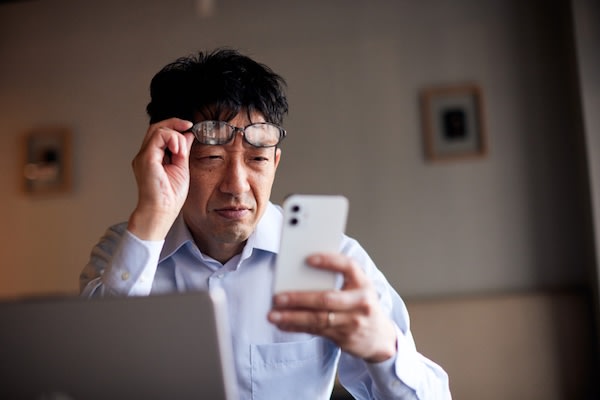Take control of your blood pressure — and your health

[5 MIN READ]
In this article:
-
Hypertension doesn’t often cause symptoms, but it’s linked to a host of serious health problems, including heart disease and stroke. The only way to know you have it is to have your blood pressure checked.
-
You can manage high blood pressure by making lifestyle changes. If lifestyle changes alone aren’t effective at controlling your blood pressure, you can also try a blood pressure medication.
-
Blood pressure medications come with side effects, but your provider can help you manage them or switch you to another medication.
Take control of your blood pressure — and your health
Some health conditions come with signs that alert you to their presence. Conjunctivitis, or pink eye, for example, is often hard to mistake with the redness and itchiness that typically accompanies it. Yet other, more serious health conditions have no signs at all.
High blood pressure, or hypertension, falls into this category. Known as a “silent killer” because it doesn’t cause symptoms — at least in its early stages — hypertension is a health condition that develops when the force of the blood pushing against the artery walls is consistently too high.
While you may not know you have hypertension, you can find out — and take steps to control your blood pressure if it’s too high.
Health problems associated with hypertension
If left untreated, hypertension can lead to several health conditions, including:
- Stroke: High blood pressure can cause blood vessels in the brain to burst or become blocked, leading to a stroke.
- Vision loss: When blood pressure is too high, it can damage the blood vessels in the eyes, causing vision loss.
- Heart failure: High blood pressure makes the heart work harder, which can cause it to enlarge and weaken. This can lead to heart failure.
- Heart attack: High blood pressure damages arteries, making them narrow and stiff, which can lead to a heart attack.
- Sexual dysfunction: In men, high blood pressure can lead to erectile dysfunction. In women, it can reduce libido.
- Kidney disease/failure: High blood pressure can damage the arteries in the kidneys, making it harder for them to filter blood properly.
Why you should know your health numbers
The only way to know if you have hypertension is to have your blood pressure checked.
“High blood pressure impacts not only your heart, but your entire body,” says Haley Hughston, M.D., a cardiologist and internal medicine specialist at Providence Covenant Cardiology Associates in Lubbock, Texas. “And the thing about blood pressure is, a lot of times, you don’t know it’s high. That’s why the first step is knowing what your number is.”
How to check your blood pressure
Blood pressure is usually recorded as two numbers, written as a ratio of systolic pressure over diastolic pressure. Systolic blood pressure refers to the pressure in your arteries when your heart beats. Diastolic blood pressure refers to the pressure in your arteries when your heart is at rest.
Normal blood pressure is 120 (systolic)/80 (diastolic) or lower. Your blood pressure is considered high if it’s 130-139/80-89.
Dr. Hughston recommends checking your blood pressure at your primary care provider’s office. But you can also try home blood pressure monitoring. If you take your blood pressure reading at home, here are a few tips to keep in mind:
- Rest five minutes beforehand.
- Use the correct cuff size.
- Make sure your arm is bare.
- Support your back.
- Uncross your legs while keeping your feet flat on the floor.
- Keep the blood pressure cuff at heart level.
- Use a validated, automated device.
If your blood pressure is high, consider taking a second reading. Just make sure you rest for a minute or two in between readings. You should also share both results with your doctor, who can help you determine next steps.
How to control high blood pressure
Monica Ferguson, M.D., an internal medicine specialist at Providence Medical Group in Santa Rosa, California, suggests several ways you can work to manage your blood pressure on your own.
“Losing weight if you’re overweight can help,” she says. “Reducing the amount of sodium you eat. Following a plant-based diet. Exercising regularly. The good thing is, most people, when they’re following a healthier diet with less sodium and exercising regularly, they actually feel better, have more energy, sleep better and lead a longer life.”
If your schedule is too demanding to follow a dedicated exercise regimen, Dr. Hughston recommends simply incorporating small daily changes to move your body more. “You can park farther out so you have to walk to get to the store or wherever it is you’re going,” she says. “You can also take the stairs instead of the elevator or just get outside and play with your kids. There are small things we can do to move our bodies, help us feel better, help us lose weight, and help lower our blood pressure.”
Still, Dr. Hughston notes, lifestyle changes like maintaining a healthy weight and prioritizing physical activity may not always be enough to get your blood pressure under control. In these cases, your doctor may recommend a blood pressure medication.
“Medicines are wonderful, and they can do extraordinary things,” she says. “If you need them, I always advocate for them.”
Dr. Ferguson understands medication’s role firsthand. She was diagnosed with hypertension at her annual OB-GYN visit a few years ago, but lifestyle changes weren’t controlling her blood pressure.
“For many people — myself included — lifestyle changes may not be enough,” Dr. Ferguson says.
How to manage medication side effects
Doctors use many blood pressure medicines, including diuretics, beta-blockers and angiotensin-converting enzyme (ACE) inhibitors, to manage hypertension. Yet each medication can come with its own side effects — frequently, things like dizziness, lightheadedness, headache and diarrhea.
It’s fairly common to develop side effects when you start taking blood pressure medications, Dr. Ferguson says. Some of them will go away over time on their own as your body gets used to the medication. Others can be managed with your doctor’s help.
“If you’re prescribed medication for high blood pressure, it is extremely important to take it every day as directed,” Dr. Ferguson says. “It is also very important to work closely with your health care team to make sure you get your high blood pressure under control, discuss any side effects you may be having from the medications, and to continue ongoing monitoring for things like kidney disease, which can be a complication of high blood pressure, and to prevent the more serious consequences like heart attack and stroke.”
If the medication you’re prescribed isn’t working to control your blood pressure or the side effects are too significant to manage, talk to your doctor, Dr. Ferguson says. “There are many different kinds of blood pressure medications available. I’m sure your health care team can find something that will work for you.”
Contributing caregivers

Haley Hughston, M.D., is a cardiologist and internal medicine specialist at Providence Covenant Cardiology Associates in Lubbock, Texas.

Monica Ferguson, M.D., is an internal medicine specialist at Providence Medical Group in Santa Rosa, California.
Find a doctor
If you are looking for a primary care or family medicine doctor, you can search for one who’s right for you in our provider directory. Our internal medicine specialists are also available to care for people who need ongoing help managing chronic conditions like hypertension. And, if you need care for your heart, our cardiologists are world-class specialists who can help you feel better while developing heart-healthy habits.
Download the Providence app
It’s all in the app: easily stay connected with Providence and your health. With the Providence app, you can schedule appointments, have virtual visits from the comfort of your own home, get health recommendations personalized for you, access your health records and so much more. Learn more and download the app.
Related resources
Five tips to lower blood pressure without medication
Your comprehensive guide to heart health
Lowering hypertension in Black and Latinx communities
This information is not intended as a substitute for professional medical care. Always follow your health care professional’s instructions.


